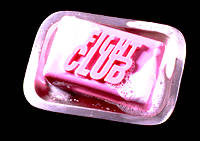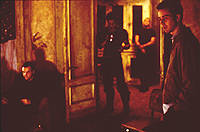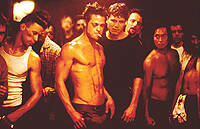
© Fox 2000 Pictures
© Monarchy Enterprises BV
© Regency Entertainment (USA)
All rights reserved
Distr. 20th Century Fox BV
Photo: Merrick Morton

|
Wow and now!
Ever heard of Tyler Durden? "He had a plan". "No fear, no
distractions". "In Tyler we trusted".
This could quite possibly be the most highly consummate movie
on the millennium edge. Near perfect in accomplishing the
battering of every barrier it intends to shatter, this film, which
many will undoubtedly erroneously find to be destructive in its
force, hides a more comprehensive and realistic view of modern
life than usually available on the contemporary screen. A
magnificent interpretation of a powerful script under the
direction of an innate craftsman has created what is
undoubtedly one of the closest things this side of 2KY to a
flawless movie.
It's difficult to do it justice without revealing a few of the crucial
twists and turns that it takes the viewer through, and yet it would
be unforgivable to reveal certain secrets that should only be
discovered as you experience it. Therefore, grin and bear the
following analysis without, at any time, mistakenly assuming
that this movie is solely an "intellectual" piece. If this movie has
anything, it has guts. (And often they're all over the ground.)
© Fox 2000 Pictures
© Monarchy Enterprises BV
© Regency Entertainment (USA)
All rights reserved
Distr. 20th Century Fox BV
Photo: Merrick Morton

|
As the titles travel on black and white through a web of vein and
tissue, we race through a microcosmic world at the base of
everything making up the larger world as we know it. It comes
from inside us and bursts into a raging silence where
destruction is practically inevitable. One man sits tied to a chair
and another stands beside him, holding a gun in his mouth.
"You know how they say you only hurt the one you love - well it
works both ways." Tyler says, "Think of everything we
accomplished."
Flashback. The Narrator (Edward Norton) and main character
of this story, leads a pleasant enough life working for an auto
company where he investigates accidents. He must determine
whether or not the costs attached to the recall of any model
vehicle as the result of a design fault made by his company are
considered reasonable when compared to the costs of paying
off eventual liabilities on insurance policies. Life, in short, is
cheap. He has an Ikea-catalogue-furnished apartment in a
fashionable building in a fashionable part of town. All the
condiments are stored neatly in their place. And yet he feels,
without much feeling, that something is terribly wrong with this
world. And his insomnia continues unchecked. In the daytime,
he totters on the edge of exhaustion while his boss
mechanically goes about performing daily chores as if he's "had
his grand latté enema." Boredom and insensitivity have
displaced and overshadowed our Narrator's earlier pleasures,
he discovers, and whereas once "we used to read pornography,
now we have the Horchow collection."
Attending a session for testicular cancer patients, inadvertently
suggested by his doctor, introduces him to a new phase.
Although not being ill in the same way they are, he moves
among them, fits in, and shares experiences as he informs us,
"I didn't say anything. People always assume the worst." One
evening, as he presses his head against the breasts of ex-
bodybuilder and steroid victim Bob (Meat Loaf) the tears begin
to flow and he discovers a new release. Routine had begun to
make him feel like "a copy of a copy of a copy," a permanent
resident of Planet Starbucks, and a member of the latté lifestyle.
The image of his tears left on Bob's sweatshirt reminds one of
the image left upon Veronica's cloth. "I found freedom, losing
all hope was freedom." His sleeplessness is immediately
cured: "Baby's don't sleep this well. I became addicted."
From that point on, participating in various groups that suffer
from one or another physical or mental problem becomes a new
way of life. It would seem that our Narrator had found the
missing element within his life, at least for a period of time,
when he tells us, "Every evening I died and every evening I was
born again."
Or so it seems, until Marla Singer turns up. Marla (Helena
Bonham Carter) is a pale, punk piece of sweet business who is
streetwise and hot to handle. She also begins attending
several of the same sessions as the Narrator, which inevitably
puts a cramp in his style. Yes, once Marla Singer has appeared
on the scene, he can't sleep again. It seems they have both
found the same special solution to their emptiness: he begins to
explain to her that "when people think you're dying, they listen
to you instead of ..," as she concludes his statement with
"Instead of waiting for their turn to speak." In desperation,
bothered by her presence, he tries to make a deal with Marla
and convince her to split up the sessions with him.
She, however, is not the only one around with whom he will be
sharing words and thoughts. Soon we are introduced to the
enchanting and magical charm of the sleazy, underclassed
soap-salesman Tyler Durden (Brad Pitt), who glides suddenly
past our sleepless, near-delirious businessman in an opposite
direction on the airport's people belt, only to wind up seated
next to him on the plane. Although our Narrator's work might
demand a simple enough task from him for this modern,
economically orientated, hi-tech world, he is having severe
difficulties contending with it. His consternation becomes more
visible among his colleagues when he starts responding oddly
to his boss's inquiries, dressing in rumpled clothing, appearing
at the office regularly with his face split open, and attending
management meetings sporting a mouthful of bloodied teeth.
"If you wake up at a different time in a different place, would you
be a different person?"
Tyler reveals that the reason for oxygen masks on planes is
because oxygen makes you high. That way, in an emergency,
everyone will relax. He is an explosive character who knows
full well what equal parts of gasoline and orange juice will do to
a lifestyle. These flying companions seem to be a match made
on another kind of level and so Tyler and he move in together.
This doesn't happen, of course, until our businessman goes
home to discover his apartment blown to smithereens and his
yin-yang table twisted on the pavement below. Such losses
would never bother Tyler, who knows that the wrong path is one
where "thing's you own, end up owning you." The police
investigate the explosion and decide that the stove's pilot light
probably went out, filled the place with gas, and, finally, the
refrigerator's mechanism clicking into action ignited everything.
We visually follow the reenactment of this theory along the
kitchen's neurological path up until the point of total destruction.
(A number of visual FX supervisors have made a feast of such
mind-boggling moments, and what a treat such moments are,
time and again, throughout the film.) This imagined
biomechanical path of nerves is curiously similar to the one
seen previously during the opening titles.
Following an evening at Lou's tavern, in the parking lot outside,
life takes a different
turn when Tyler asks his newfound friend to hit him as hard as
he can (,as a playful father might ask his son). They punch
each other until they're bloody and exhausted. This event
immediately follows their agreement to share Tyler's living
quarters. With typical foresight, Tyler already knows where
they're heading. He has to break down the wall of inhibitions
that his new buddy lives with. He confronts him, knowing he
wants to crash at his place, by saying "3 pitchers of beer and
you still can't ask." Tyler's philosophies always sound very
basic: "Stop being perfect. Let's evolve."
Tyler's digs consist of a derelict house with ruined walls and
wood swelling with water. It is here, in the shadows of a
corrupted existence, that our Narrator travels further into the
darkness. He reads magazines where body parts are
personified and begins to view the world in a parallel way. He
often finds himself reflecting with the oddest self-imposed
abstractions: "I am Jack's medulla oblongata." "I am Jack's
cold sweat." "I am Jack's complete lack of surprise." "I am
Jack's smirking revenge." "I am Jack's colon." To this last,
Tyler humorously responds, "I am cancer. I kill Jack." When
Tyler speaks the acid truth, he says succinctly, "It's only after
we've lost everything, that we're free to do anything." The
Narrator also realizes "I am Jack's wasted life." Will Jack fall
down and break his crown?
Marla reappears on the scene after an attempted suicide and
frequently drifts in and out of this new household where she
maintains her relationship with the Narrator while she and Tyler
Durden are screwing each other into oblivion in all manner of
shapes and forms with all sorts of accessories.
© Fox 2000 Pictures
© Monarchy Enterprises BV
© Regency Entertainment (USA)
All rights reserved
Distr. 20th Century Fox BV
Photo: Merrick Morton

|
Bloodier fights become a part of daily life not only for the two
men, but also for plenty of others who are irretrievably drawn to
this new activity; this new brotherhood; this new club. On
Saturday nights "we were finding out that we were not alone."
"It wasn't Tyler and I that made it happen. Tyler and I just gave
it a name." This underground world, for all its violence, is not
uncontrolled; there are six disciplinary rules to be followed by
the Fight Club and the first two are most important. As half-
naked men hulk around the sweaty basement and demonstrate
their powers of prowess upon each other, their territory grows.
The gatherings increase both in number and frequency,
eventually forming a movement with mixed membership, usually
sharing the origin of a working class background. This is their
territory. These are the people society depends on; they make
the world turn round. "We guard you while you sleep. Do not
fuck with us." The well-established may relish their solar units
and remote controls as much as being catered to by the lower
classes, but Fight Club members, in their private moments,
climb down a dark stairway to find their own answers. "Who
you were in the Fight Club is not who you were in the world."
"When the fight was over, nothing was solved, but nothing
mattered."
"In a long enough life line, the life expectancy for everyone
drops to zero."
The Narrator and Tyler have such an intensely close
relationship that they seem indivisible. When the former
reaches a moment where he thinks "I am Jack's inflamed sense
of rejection" as a result of Tyler's lack of attention, he hungers
to destroy something beautiful and does so quickly and
violently, after which Tyler simply responds, "Where'd you go
psycho, boy?" They are, without a doubt, as close as two
people can be. But, as in many relationships, a harsh truth
comes hurtling toward the Narrator when he ultimately realizes
"I am alone. My father despised me. Tyler despised me" and
he is finally faced with the reflection "I am Jack's broken heart."
Tyler has a vision of a New World before him where everyone is
equal. How he intends to achieve it and make it a reality, is a
question that the movie will answer. An amazing portrait of
anarchy for our time, in which the instrumental figure is the kind
of guy who "goes around slicing sex organs into Cinderella."
 A MUST SEE A MUST SEE
You'd better believe it, or I'll bash your brains in.
While some can permit themselves the luxury of ignoring
awkward confrontations with streetlife characters and other
undesirable aspects of existence by keeping them locked
outside the doors of their safe and secured homesteads, others
are continuously bombarded by the images before their eyes
and in their minds. Murder, crime, and poverty have not
disappeared; they have only been pushed into a corner out of
sight. Decreasing boundaries in this contemporary world
transmit daily atrocities from outside. Denial no longer keeps
everyone safe. Security is becoming a state of mind and not
remaining a very dependable one. The ethical world is falling
apart at the seams and nothing of value is replacing it. Is it any
wonder that people are falling over the edge? "Our great war is
a spiritual war. Our great depression is our lives."
Some may have trouble with parallel realities presented in this
elaborately constructed, derisive, decisive, divisive and diverse
tale. Those who can see through the facade of created images
and fantasies will realize, perhaps, that it is a parable of modern
life and the saga of a man twisted and contorted by world that is
contradictory to his existence. He survives too long in
accordance with dictates and roles that he must fill and fulfill in
order to keep on top. Only when he crawls to the bottom, does
he manage to "feel" his own existence. Only when he creates
his own golem can he blast the heap to hell and take control of
it all. If the beast takes control completely, he will dissolve into
a universe that he has been forced to take part in and would
never recover himself. The movie, it seems, more an argument
against hate, violence, and destruction than a movie containing
gratuitous violence, as many, unfortunately, will undoubtedly
believe.
Director David Fincher has led a massively talented crew (DP
Jeff Cronenweth, production designer Alex McDowell, film editor
James Haygood, costume designer Michael Kaplan, make-up
FX supervisor Rob Bottin, music supervisors Michael Simpson
& John King and many, many more), and elicited stunning
performances from every member of the cast to realize Jim
Uhls' electrifying screenplay adaptation of Chuck Palahniuk's
best-selling novel. A movie astounding in its approach toward
massive social issues which most people ignore, deny, and
frequently do not recognize. It is embedded with an anarchistic
sense that can be argued from several viewpoints. The astute
mind will find a feast. Many others will enjoy it equally, but for
other reasons. Coming from right, left or center, it is an
experience not to be missed, whether or not it is especially to
your liking; a fascinating, complex, and convex structure which
can easily be viewed several times and offer new facets
contributing to a further understanding. It grows on you.
In an age filled with job dissatisfaction, unemployment,
homelessness, abuse, depression, Prozac breakfasts,
complacency, insensitivity, apathy, desires of revenge, lust for
vengeance and retribution, is multiple personality disorder
something out of the ordinary? In a world where ethics are
inconceivable and faith is displaced, drugs can often become
the opiate of the people; other things will do nicely too.
Passively wandering around in such a world and suffering the
damage done by unreasonable restraints is enough to get you
out of touch with yourself. There is nothing to believe in
because there is nothing to look forward to. Why let others
bash your brains in, when you can you can take care of
business yourself? At least, it gives one a heightened sense of
responsibility. Politicians might look about themselves when
standing in front of cameras, as if a stupor has fallen upon
them, to quickly tell their constituents that things happen in
today's world that are completely incomprehensible. Then the
masses nod their heads in agreement and say that it must be
true, if it's on TV.
© Fox 2000 Pictures
© Monarchy Enterprises BV
© Regency Entertainment (USA)
All rights reserved
Distr. 20th Century Fox BV
Photo: Merrick Morton

|
Is it still necessary to question why someone walks into a
classroom, gymnasium or office building and begins shooting at
random targets? "Why" seems to be the operative question
when the actual issue is really "why not?" Isn't it merely a
reaction to the world we've been establishing over the past
decades, albeit with several roots solidly in the past. The old
roles don't work anymore (not that they necessarily ever did),
so the new ones replacing them have evolved and grown out of
the mess left behind. Historical perspective is slowly
disappearing alongside a lack of values, so nobody will take
much notice, anyway.
And the beat goes on.
Do you like yourself?
© 1994-2006 The Green Hartnett
|

